Healthcare costs can rise fast after an injury, leaving you with a lot of bills. In the United States, there’s help available in the form of medical expense reimbursement programs and policies. These are designed to help you get back the money spent on your health care due to injuries. Knowing how to get this financial support is key to getting what you’re owed.
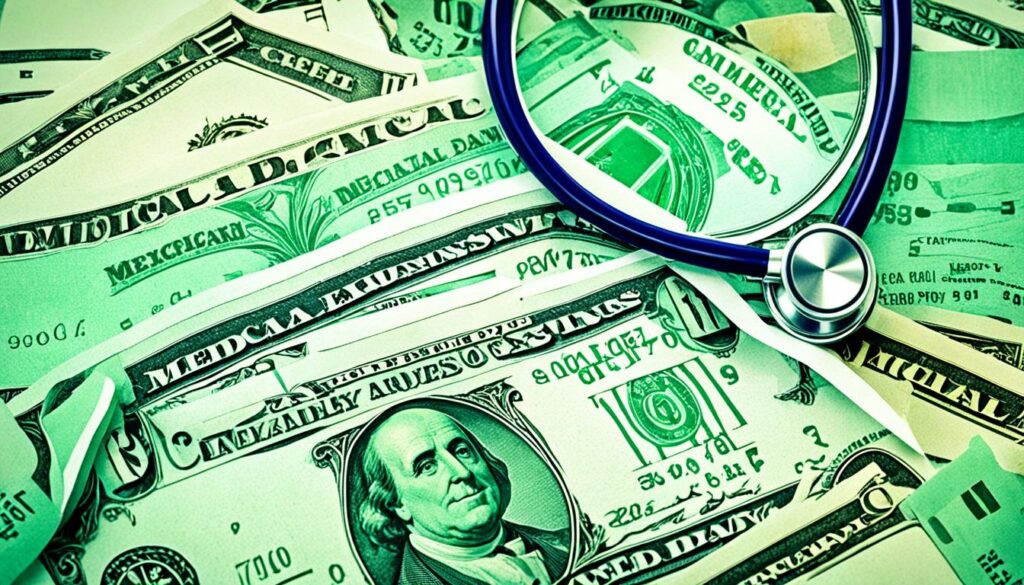
Key Takeaways:
- Medical expense reimbursement programs and policies exist to assist individuals in receiving compensation for injury-related healthcare costs.
- Understanding the process of medical expense reimbursement is essential in securing the necessary funds.
- Insurance claims, personal injury lawsuits, and other avenues can be utilized to seek medical expense reimbursement.
- Seeking legal representation is recommended to navigate the complexities of the reimbursement process.
- Be sure to document all medical treatments and expenses related to the injury for accurate reimbursement.
Do you know about all the ways to get reimbursed for your medical costs after an injury? What actions should you take to make sure you get the compensation you deserve? We’re going to dive into the topic of medical expense reimbursement for injury cases. Let’s find out how you can be properly compensated for your treatment.
Who Pays for Medical Expenses After a Personal Injury?
After getting hurt, figuring out who pays for medical bills is a big worry. Usually, the person or company at fault covers the costs.
Often, the at-fault party’s insurance handles the bills. What insurance applies depends on how the injury happened. For car accidents, auto insurance steps in. Work injuries might be covered by employer’s insurance. And if you slip and fall at someone’s place, their personal liability insurance might pay.
Sometimes, the at-fault party might not have enough insurance. Then, your own health insurance might have to pay. You could also look into other insurances you have, like auto or homeowner’s insurance, to cover the costs.
Dealing with medical bills, especially with underinsured or no insurance, is hard. Getting advice from a personal injury attorney is crucial. They can help you find all ways to cover your bills and get what you deserve.
Knowing who should pay and looking into other insurance options is key. This way, you can handle the complicated world of medical bills. And you can make sure you have the support you need for your recovery.
| Insurance Type | Responsible for Medical Expenses? |
|---|---|
| Auto Insurance | Yes, for car accidents |
| Employer’s Insurance | Yes, for workplace injuries |
| Personal Liability Insurance | Yes, for slips and falls |
| Personal Health Insurance | Yes, as a backup option |
| Auto Insurance | Yes, for underinsured or uninsured responsible parties |
| Homeowner’s Insurance | Yes, for underinsured or uninsured responsible parties |
Types of Covered Medical Expenses
If you get injured, knowing which medical costs are covered is key. The person at fault’s insurance often covers necessary treatments for your injury. This can include services like:
- Ambulances and emergency services
- Hospital and urgent care visits
- Doctor’s visits and co-pays
- Physical therapy and rehabilitation
- Surgeries and follow-up care
- Diagnostic tests like X-rays and MRIs
- Chiropractic care
These key services help you recover and are part of your medical expense claims. Make sure all treatments are well-recorded and directly tied to your injury. This helps in getting compensation.
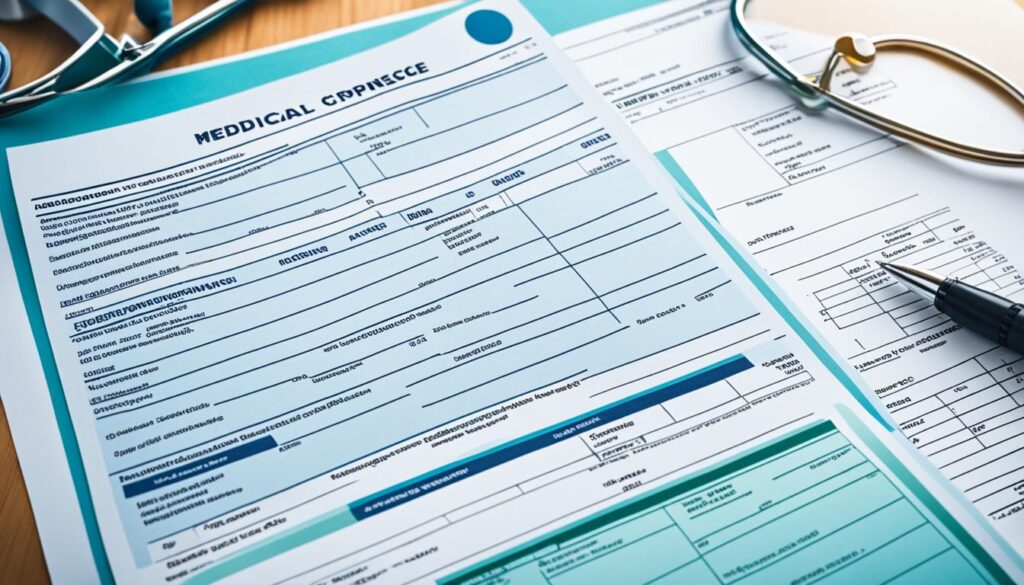
| Treatment | Coverage |
|---|---|
| Ambulances and emergency services | Covered |
| Hospital and urgent care visits | Covered |
| Doctor’s visits and co-pays | Covered |
| Physical therapy and rehabilitation | Covered |
| Surgeries and follow-up care | Covered |
| Diagnostic tests (X-rays, MRIs, etc.) | Covered |
| Chiropractic care | Covered |
The table shows these medical expenses are usually covered. This means you get the needed care without the financial stress.
Dealing with Underinsured or Uninsured Responsible Parties
If someone who caused an injury has little or no insurance, getting money for medical bills gets tricky. You might need to look at other options.
Using your health insurance can be a backup plan. It might pay for treatments that others won’t cover due to lack of insurance. Make sure to know what your health plan covers for injuries.
Your car insurance might also help, especially after accidents. It could pay medical bills if the other person’s insurance isn’t enough. Always check your policy details with your car insurance company.
Sometimes, homeowner’s insurance can step in too. If you got hurt on someone’s property, their homeowner’s policy could cover your bills.
It’s vital to talk to lawyers if you’re dealing with underinsured or uninsured parties. They can help you look at all your options. They’ll talk to insurance companies for you and protect your rights.

It’s tough dealing with underinsured or uninsured parties, but don’t lose hope. Look into using your own insurance like health, auto, or homeowner’s. Getting help from lawyers also makes a big difference. They’ll help you find the best way to get the compensation you need.
Seeking Compensation for Medical Expenses
There are two ways to seek compensation for medical expenses after an injury. You can either negotiate a settlement or prove your case in trial. Most people choose to negotiate with the responsible party’s insurance. This can avoid a long and costly trial.
For a fair settlement, presenting strong evidence is key. Evidence can be medical records, bills, and expert views. These show how serious your injuries are and the medical costs involved.
Some health insurance policies have a subrogation clause. This means they might want reimbursement if you get compensated for medical bills. Talking to a personal injury attorney can clarify these points. They ensure all parties get a fair deal.
Why Settle Instead of Going to Trial?
Settling is usually quicker and cheaper than a trial. Trials can drag on, making your medical bills pile up. Settling lets you get compensation sooner to pay off those bills.
Also, settling gives you more control over the outcome. In a trial, a jury or judge decides. Negotiating lets both sides work together to find a good solution.
The Role of a Personal Injury Attorney
Dealing with compensation claims is hard, especially when injured. A personal injury attorney can really help. They offer legal advice and can represent you throughout the process.
They’re good at dealing with insurance companies to get a fair deal. They also organize your evidence to support your case. If you end up in court, they can make a strong argument on your behalf.
An attorney ensures you’re well-represented when seeking medical expense compensation. You can focus on getting better, knowing you’re in good hands.

The Benefits of Consulting a Personal Injury Attorney
“A personal injury attorney offers expertise and support in seeking full compensation for medical expenses.”
Having an attorney is crucial, whether you settle or go to trial. They understand personal injury law well. This means they can handle complex legal issues and present your case effectively.
With an attorney, your main focus can be your recovery. They’ll deal with insurance and legal issues. Their experience with such cases improves your chance of getting full compensation.
It’s your right to seek compensation for medical expenses. A skilled personal injury attorney ensures you do this with confidence. They aim for a fair resolution for you.
Compensation Available for Medical Expenses
Getting hurt in an accident or because someone was careless is tough. Knowing that the person or business at fault must pay for your medical expenses is key. They must cover both now and later costs caused by the injury. This includes hospital stays, surgeries, or any treatments needed for your recovery.
It’s not just about physical injuries, either. Emotional pain from the accident matters too. Feeling stressed or upset afterwards is normal. Compensation should help with these feelings as well.
Plus, you might need special medical equipment to get better or help with everyday tasks. This could be a wheelchair or something to help you move more easily. Whoever is responsible should pay for these important tools.
Getting to your medical appointments is also important. With certain injuries, you might have to see your doctor or a specialist a lot. The person at fault should take care of your travel costs. This makes sure you can get the care you need without it costing you more.
“Compensation for medical expenses should encompass both present and future costs, including adaptive medical devices and transportation to medical appointments.”
Here’s a table that shows what you might get compensated for:
| Categories | Description |
|---|---|
| Present Medical Expenses | Immediate medical costs, such as hospital bills, surgeries, and doctor visits. |
| Future Medical Expenses | Predicted costs for ongoing treatment, rehabilitation, and specialized care. |
| Emotional Injuries Compensation | Reimbursement for the emotional distress caused by the accident or injury. |
| Adaptive Medical Devices Coverage | Funds to cover the cost of adaptive medical devices, such as prosthetics or wheelchairs. |
| Transportation to Medical Appointments Coverage | Financial assistance for transportation to medical facilities and appointments. |
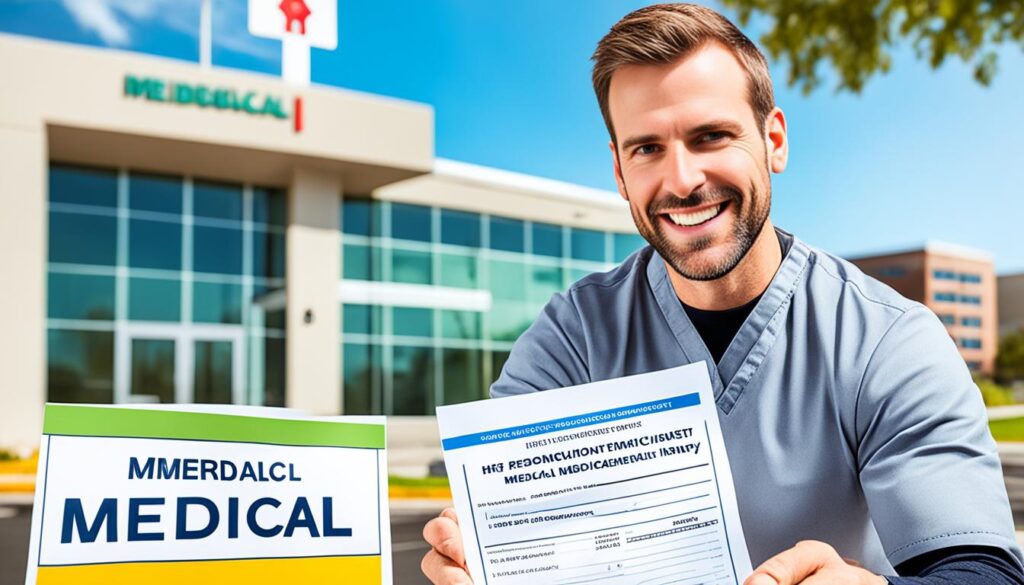
Covering Required Medical Care Until Case Resolution
Personal injury cases can take a long time to solve. But, it’s key to remember that you can’t stop medical care while waiting. This is because getting treatment is vital for healing. Luckily, there are ways to make sure you get the medical care you need until everything is settled.
Health Insurance Coverage
Health insurance is one way to cover medical costs. If you have private health insurance, it can pay for your treatment. But remember, you might have to pay some costs yourself, like deductibles and copayments. Check what your insurance plan covers so you know what to expect.
Personal Injury Protection (PIP) Insurance
PIP insurance is another option. It’s a type of insurance that pays for some medical costs, no matter who caused the injury. Often, PIP coverage is part of your car insurance. It can help with medical bills from an injury.
Medical Payments Coverage
Medical payments coverage is also linked to car insurance. This coverage is optional in some places, but it may already be part of your policy. It pays for medical costs after an injury, regardless of who was at fault.
Pre-Settlement Funding
Sometimes, people in personal injury cases struggle to pay for their medical care. Pre-settlement funding can help during these times. It’s a cash advance based on what you might get from your case. This money can be used for medical bills while you wait for the case to end.
But, it’s important to think carefully about pre-settlement funding. Talk to your injury lawyer to see if it’s a good choice for you.
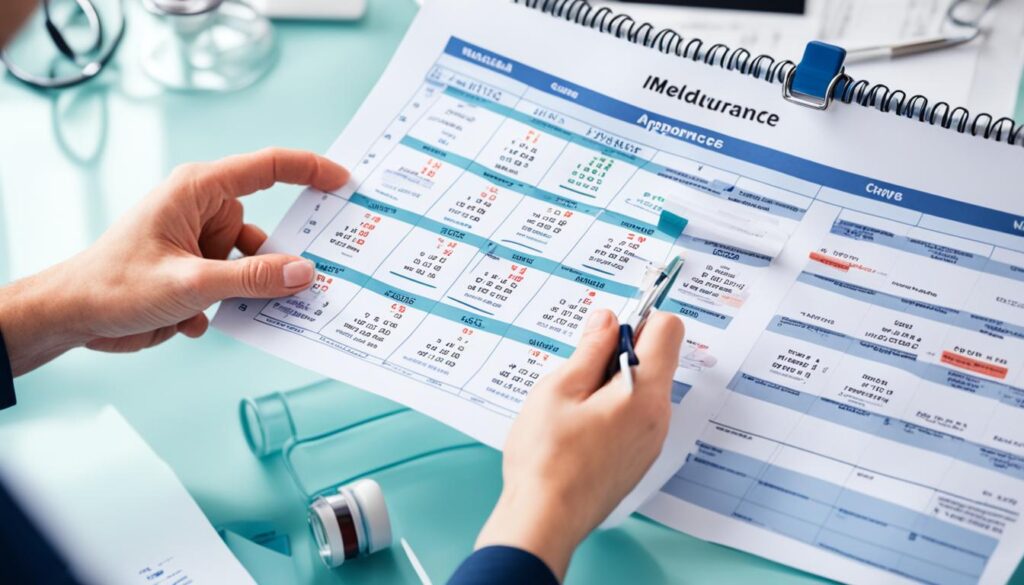
In summary, it’s crucial to keep your medical treatment going until your case is done. Options like health insurance, PIP insurance, and pre-settlement funding can help with costs. Talk to your injury lawyer to find the best way to pay for your care.
Recovering Expenses and Losses Related to Injuries
People hurt in accidents can get money for various losses, not just medical bills. This includes money for property damage, lasting scars or disabilities, and even mental anguish. Getting this compensation is key to help them recover fully.
Tangible Losses
If your things were damaged in an incident, you could be compensated. This covers repair costs or the item’s value if it can’t be fixed. Having clear records and proof of what you own is necessary.
Money for disabilities or scars is also vital. If injuries have changed how you look or move, you might get compensation. This helps deal with changes in your life and work. Doctors’ reports and expert views are important here.
Intangible Losses
Compensation also covers physical pain and emotional suffering after an injury. It’s about the hurt you feel now and any long-term pain. Showing medical records and other proofs is crucial to claim this money.
If an incident left you with mental health issues like anxiety or PTSD, you could get help. You’ll need medical proof to back up your claim. This makes sure you’re compensated for mental troubles too.
A major injury can affect your daily life and happiness. This might mean you can’t enjoy hobbies or spend time with loved ones like before. Sharing detailed stories on how your life has changed can help your case.
To get money for these losses, detailed paperwork, legal knowledge, and solid proof are necessary. Talking to a lawyer who knows about these claims can increase your chance of getting a fair deal.
Note:
“It’s crucial to show how an injury has hurt your life when asking for compensation. By focusing on both visible and invisible losses, you can make a stronger case for the money you need.”
| Expense and Loss | Description |
|---|---|
| Property Damage Compensation | Reimbursement for damage to personal property |
| Disability and Disfigurement Compensation | Compensation for lasting physical disabilities or disfigurement |
| Pain and Suffering Compensation | Reimbursement for physical and emotional distress experienced |
| Mental and Emotional Distress Compensation | Compensation for psychological harm |
| Diminished Quality of Life Compensation | Compensation for long-term impact on overall well-being |
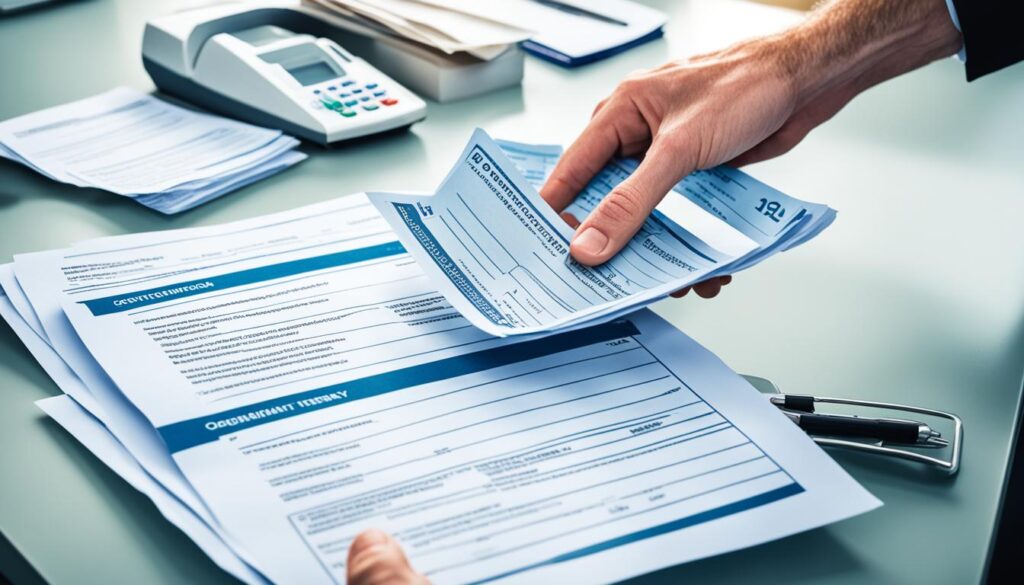
The Role of a Personal Injury Lawyer in Seeking Medical Expense Reimbursement
Getting money back for medical bills after an injury is tough. That’s why it’s smart to hire an experienced personal injury lawyer. They guide you through the law and aim to get you properly paid for your injuries. They stand by your side, fighting for you from start to finish.
Here’s how a personal injury lawyer can help:
Legal Assistance
A personal injury lawyer walks you through each step. They know personal injury law well and will teach you about your rights and choices. With their help, you’ll know how to move forward wisely.
Insurance Negotiation
Dealing with insurance companies is tough. They often try to pay less. Your lawyer will talk to them for you. They’ll push for a fair deal to cover your medical costs, so you don’t get shortchanged.
Evidence Collection
A strong case needs strong proof. Your lawyer will gather evidence like medical files and accident reports. Sometimes, they even talk to experts. This proof is key to getting your medical costs paid.
Case Value Calculation
Figuring out your case’s worth is hard. A good lawyer looks at all your losses, like lost pay and pain. They use their skills and knowledge to set a fair price on your case.
Demand Letter Writing
A demand letter asks for payment and explains your case. Your lawyer writes it strongly, showing your evidence and legal points. This boosts your chance of getting a good settlement.
With a personal injury lawyer, you can heal while they handle the tough legal stuff. Their skill in talking deals and their commitment to you means you get what you should for your healing and lost money.
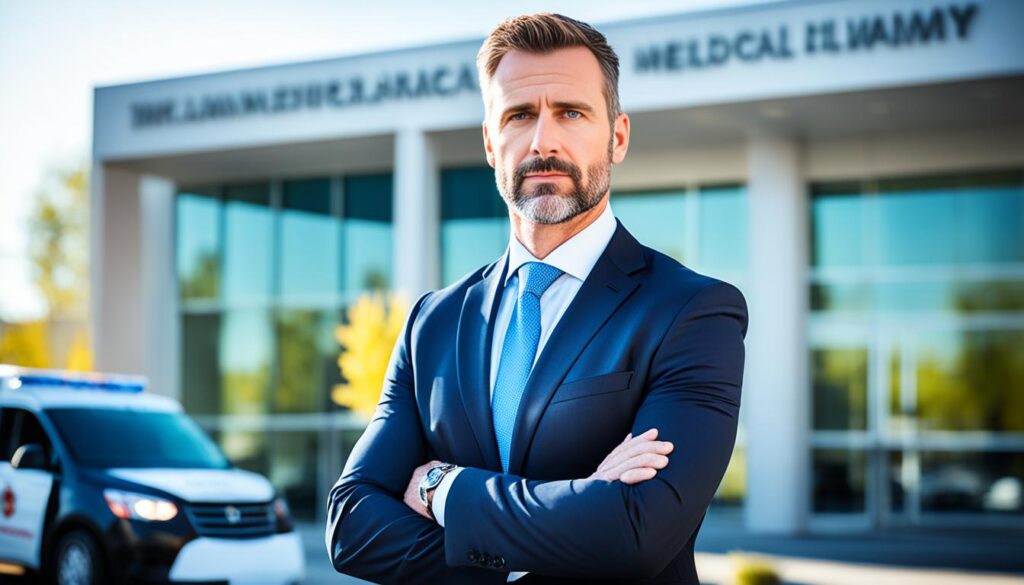
If you’re dealing with medical bills from an injury, don’t do it alone. Talk to a personal injury lawyer. They’ll help you through the legal maze and get you the money you deserve.
Conclusion
Getting the money you deserve for injury-related health costs is key. You need to know who will pay these bills. This could be through insurance, lawsuits, or other ways. You must do what’s needed to get the right compensation.
You may settle or go to trial, but help from a good personal injury lawyer is key. They can help you through the tough parts of getting your medical bills paid.
Make sure to use any insurance and legal help you can to get the money you need for care. Always have your medical records and bills ready. And think about how health insurance payback rules might affect your case. By doing these things, you can get through the reimbursement process well and get what you’re owed.
Don’t let the cost of care after an injury stress you out financially. Be smart and reach out to a skilled personal injury lawyer. They can make the reimbursement process easier. With their guidance, you can get the money for your medical bills. Then you can focus on getting better.